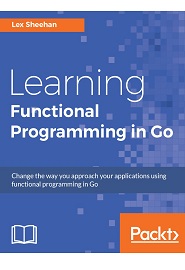
English | 2017 | ISBN: 978-1787281394 | 672 Pages | PDF, EPUB, MOBI | 126 MB
Learning Functional Programming in Go: Change the way you approach your applications using functional programming in Go
Function literals, Monads, Lazy evaluation, Currying, and more
Functional programming is a popular programming paradigm that is used to simplify many tasks and will help you write flexible and succinct code. It allows you to decompose your programs into smaller, highly reusable components, without applying conceptual restraints on how the software should be modularized.
This book bridges the language gap for Golang developers by showing you how to create and consume functional constructs in Golang.
The book is divided into four modules. The first module explains the functional style of programming; pure functional programming (FP), manipulating collections, and using high-order functions. In the second module, you will learn design patterns that you can use to build FP-style applications. In the next module, you will learn FP techniques that you can use to improve your API signatures, to increase performance, and to build better Cloud-native applications. The last module delves into the underpinnings of FP with an introduction to category theory for software developers to give you a real understanding of what pure functional programming is all about, along with applicable code examples.
By the end of the book, you will be adept at building applications the functional way.
What You Will Learn
- Learn how to compose reliable applications using high-order functions
- Explore techniques to eliminate side-effects using FP techniques such as currying
- Use first-class functions to implement pure functions
- Understand how to implement a lambda expression in Go
- Compose a working application using the decorator pattern
- Create faster programs using lazy evaluation
- Use Go concurrency constructs to compose a functionality pipeline
- Understand category theory and what it has to do with FP
Resolve the captcha to access the links!